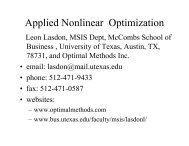Sunday
Sunday
Sunday
Create successful ePaper yourself
Turn your PDF publications into a flip-book with our unique Google optimized e-Paper software.
SA73<br />
■ SA73<br />
73- Suite 324- Hyatt<br />
Economics<br />
Contributed Session<br />
Chair: Lorena Berumen, Professor, Universidad Panamericana, Augusto<br />
Rodin 498, Col. Insurgentes Mixcoac, Mexico, DF, 03920, Mexico,<br />
laberumen@up.edu.mx<br />
1 - Estimating Real Money Balances for a Selected Asian Country:<br />
A Simultaneous Equation Model<br />
Abul Jamal, Professor, Southeastern Louisiana University, College<br />
of Business, Hammond, LA, 70402, United States of America,<br />
ajamal@selu.edu, Yu Hsing<br />
Equilibrium real balances and interest rates have been the subject of extensive<br />
research. Most studies presume the supply of money to be determined by the<br />
central bank and that the interest rate is only determined by the demand for<br />
money In this paper we use both the demand for and supply of money to<br />
estimate real money balances in a selected Asian country.<br />
2 - The Volatility Characteristics of China’s GEM Market and the<br />
Countermeasures<br />
Jie Xiong, Xi’an Jiaotong University, Postbox 2230, School of<br />
Management, No.28 Xianning West Road, Shaanxi, Xi’an, China,<br />
xiongjie@stu.xjtu.edu.cn, Ju’e Guo, Dong Qian<br />
Select the data of China’s GEM index from June 1, 2010 to October 28, 2011.<br />
EMD method is used to analyze factors that influence the fluctuations of index.<br />
Three factors are found: trend, low-frequency component and high-frequency<br />
component. Than we use the AR-EGARCH-M model to analyze the dynamic<br />
relationship between the returns and volatility of the GEM market and give the<br />
corresponding countermeasures.<br />
3 - The Role of Product Variety and Maturity in the Market<br />
Valuation of IT Intensive Firms<br />
Wael Jabr, Assistant Professor, University of Calgary, 2500<br />
University Dr NW, Calgary, AB, T3A6L5, Canada,<br />
wjabr@ucalgary.ca, Eric (Zhiqiang) Zheng<br />
The pervasiveness and intensive use of Information Technology in every aspect of<br />
firm processes have enabled firms to maintain a portfolio of diverse products and<br />
allowed improved performance. In this study, we address the question of how<br />
companies should best manage their portfolio of IT products under disruptive<br />
environments. We hypothesize that diversity and maturity of products play an<br />
integral part in the firm’s performance and its market value.<br />
4 - A Panel Data Model to Explain Technical Change through IT in<br />
Latin America<br />
Lorena Berumen, Professor, Universidad Panamericana, Augusto<br />
Rodin 498, Col. Insurgentes Mixcoac, Mexico, DF, 03920, Mexico,<br />
laberumen@up.edu.mx, Jen Ai de la Cruz, Gilberto González<br />
Pèrez, Margarita Hurtado, Irma Glinz<br />
In this paper we evaluate the IT’s impact over the conformation of the export<br />
profile of Argentina, Brazil and Mexico through a dynamic panel data model. We<br />
established that the adaptation and learning process is a function of expenditure<br />
on education and innovation, infrastructure and the dynamic of consumption.<br />
<strong>Sunday</strong>, 11:00am - 12:30pm<br />
■ SB01<br />
01- West 101- CC<br />
Genetic Algorithms and Ant Colonies<br />
Contributed Session<br />
Chair: Maria Woodside-Oriakhi, Assistant Professor,<br />
The College of the Bahamas, Oakes Field, Nassau, GT2602, Bahamas,<br />
moriakhi@cob.edu.bs<br />
1 - Genetic Algorithm and New Heuristic in Block Relocation<br />
Problem - Fuel Reduction<br />
Mazen Hussein, PhD Candidate, University of Wisconsin,<br />
Milwaukee, 1559 N. Prospect Ave., Apt # 305, Milwaukee, WI,<br />
53202, United States of America, mhussein@uwm.edu, Matthew<br />
Petering<br />
This research considers a variation of the block relocation problem (BRP). A set of<br />
identically-sized items is to be retrieved from stacks in a specific order using the<br />
minimum fuel consumption. In this work we consider container weight in fuel<br />
consumption calculations and explicitly tracking the containers moves. We<br />
developed a new heuristic that is embedded in a genetic algorithm. Results show<br />
that the methodology is effective in identifying near-optimal parameter settings.<br />
INFORMS Phoenix – 2012<br />
80<br />
2 - Evaluation of Multi-objective Genetic Algorithms on a<br />
Preventive Maintenance Scheduling Model<br />
Kamran Moghaddam, Assistant Professor of Systems Engineering,<br />
Southern Polytechnic State University, 1100 South Marietta<br />
Parkway, Marietta, GA, 30060, United States of America,<br />
kmoghadd@spsu.edu<br />
A multi-objective optimization model to find optimal preventive maintenance and<br />
replacement schedules of a multi-component system is used to evaluate<br />
performance of different multi-objective genetic algorithms. This multi-objective,<br />
nonlinear, mixed-integer model is an NP-hard optimization model that cannot be<br />
solved using exact algorithms. The different performance metrics are used to<br />
evaluating closeness and diversity of non-dominated solutions found by multiobjective<br />
genetic algorithms.<br />
3 - Ant Colony Optimization for the Cardinality Constrained<br />
Portfolio Problem<br />
Maria Woodside-Oriakhi, Assistant Professor,<br />
The College of the Bahamas, Oakes Field, Nassau, GT2602,<br />
Bahamas, moriakhi@cob.edu.bs<br />
This paper extends the mean-variance model of Markowitz to include the<br />
cardinality constraints This limits the number of assets held in the portfolio and<br />
sets bounds on the proportion of an asset held. An ant colony optimization<br />
heuristic algorithm is presented using data from seven real world market indices.<br />
■ SB02<br />
02- West 102 A- CC<br />
Joint Session: DAS/ENRE-Energy: Expert Elicitation<br />
of Energy Technologies: Theory and Practice<br />
Sponsor: Decision Analysis & Energy, Natural Res & the<br />
Environment/Energy<br />
Sponsored Session<br />
Chair: Erin Baker, University of Massachusetts, Amherst, MA,<br />
United States of America, edbaker@ecs.umass.edu<br />
1 - Elicitations of Energy Penalties for Carbon Capture<br />
Technologies<br />
Karen Jenni, Principal, Insight Decisions, LLC, 2200 Quitman St.,<br />
Denver, CO, 80212, United States of America,<br />
kjenni@insightdecisions.com, Gregory Nemet, Erin Baker<br />
We conducted elicitation interviews with 15 experts in carbon capture<br />
technologies, exploring the effects of different energy policies on the viability of<br />
and the energy penalties (EP) for 6 technologies, by 2025. Expert opinions varied<br />
substantially both within a specific technology and between technologies. A<br />
worldwide carbon pricing scenario leads to a decrease in the mean EP of 1% to<br />
10% across the technologies; a scenario of increased US government R&D leads to<br />
a decrease of 6% to 14%.<br />
2 - Online Expert Elicitation Tools: Development and Case Studies<br />
in Energy Technology Assessment<br />
Steve Davis, Senior Research Associate, Carnegie Institution of<br />
Washington, 260 Panama Strett, Stanford, CA, 94305,<br />
United States of America, sjdavis@dge.stanford.edu, Karen Fries<br />
We are developing innovative tools to facilitate online expert elicitation in order<br />
to reduce the time and resources required to characterize uncertainty and the<br />
sources/scope of disagreement among experts. Such characterization is critical to<br />
directing R&D efforts on technical topics. We focus on experts’ subjective<br />
judgments on energy technologies. Here we demonstrate the tools under<br />
development and present results of testing with experts on solar PV and airborne<br />
wind energy systems.<br />
3 - Uncertainty and Surprise in Energy Forecasts:<br />
The Cost of Photovoltaics<br />
Max Henrion, CEO, Lumina Decision Systems, 26010 Highland<br />
Way, Los Gatos, CA, 95033-9758, United States of America,<br />
henrion@lumina.com, Evan Sherwin<br />
Power system planners and other energy analysts would like to know the future<br />
performance and costs of renewable and fossil energy technologies. Several<br />
research groups have used expert elicitation to assess uncertainty using<br />
probability distributions for these quantities. We compare projections for<br />
photovoltaics. Recent dramatic and unexpected cost reductions suggest systematic<br />
overconfidence in expert assessments.



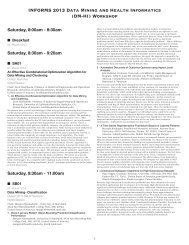
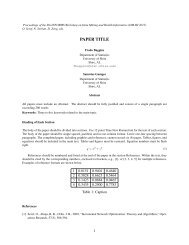
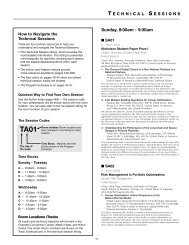
![[PDF] Charlotte Back Matter](https://img.yumpu.com/17933057/1/190x245/pdf-charlotte-back-matter.jpg?quality=85)
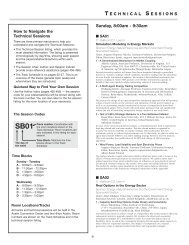
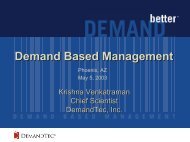
![[PDF] ALIO Back Matter](https://img.yumpu.com/17932960/1/190x245/pdf-alio-back-matter.jpg?quality=85)
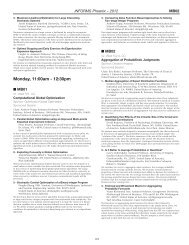
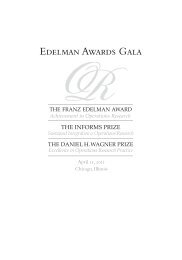
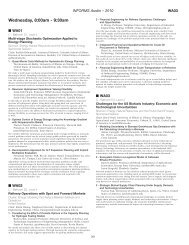
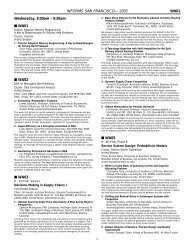
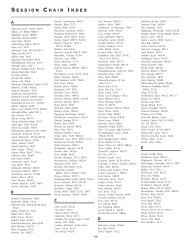
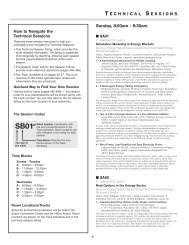
![[PDF] Monday, 8:00am - 9:30am](https://img.yumpu.com/17932954/1/190x245/pdf-monday-800am-930am.jpg?quality=85)
